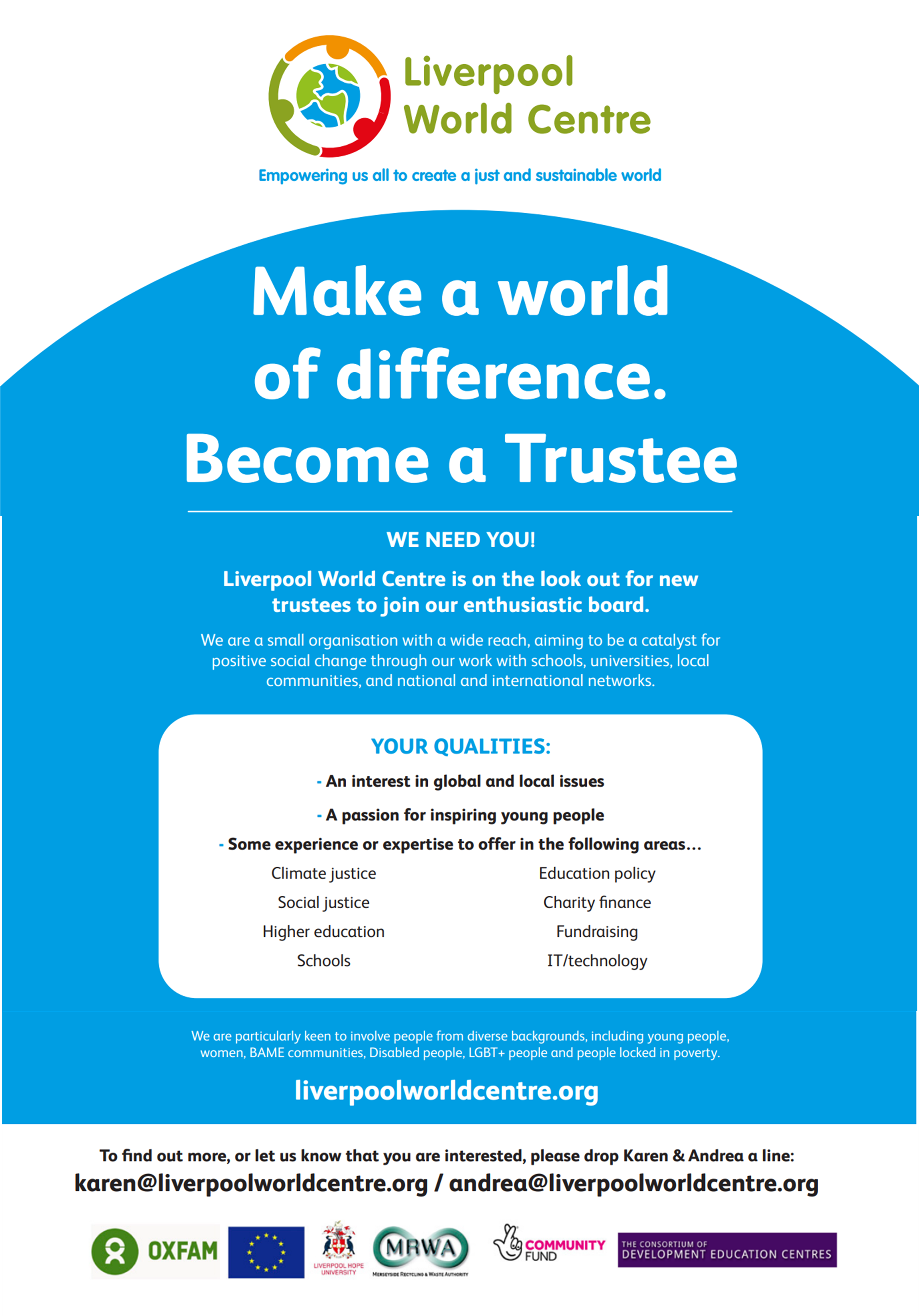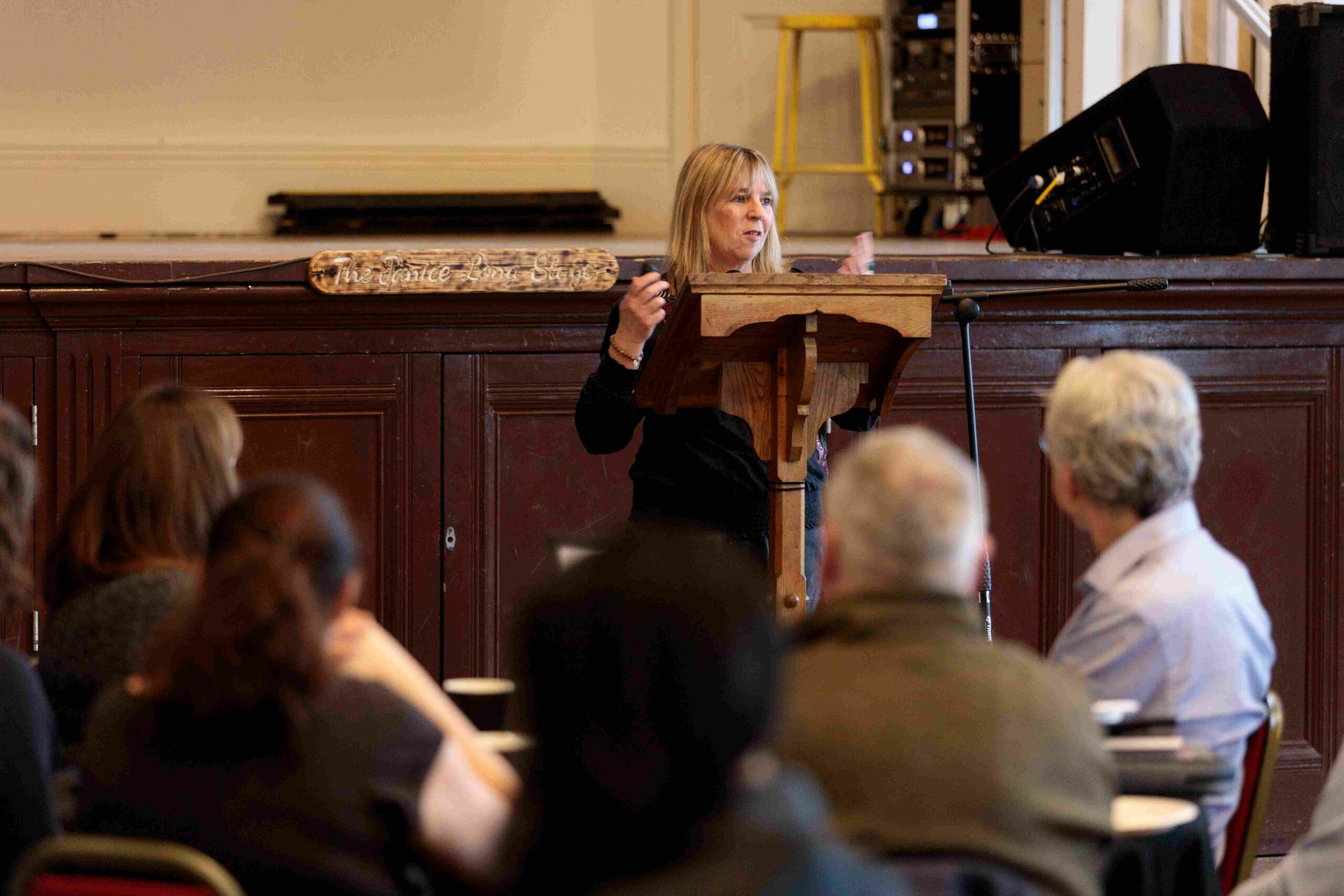Liverpool World Centre and Faiths4change are working on a project supported by the Merseyside Recycling and Waste Authority Community Fund to inspire young people across the Liverpool City Region to change attitudes and behaviours around consumption and waste. The project is tackling three big issues: food waste, textile waste and mobile phone waste. We are now eagerly anticipating the next part of the project: a collaboration day where the young people can share, develop, and refine their action plans and learn from each other. Making a difference to the larger community is embedded in the project and this event also supports this goal. It is yet another way in which the young people will share their work with a wider group to impact societal thinking on waste and the Net Zero objective.
The project has engaged young people in hands-on workshops where they use innovative tools to explore their own waste patterns and how to change them. They are gaining skills and confidence to launch action and awareness campaigns where they aim to make a difference in their local communities and beyond, reaching policy makers and local business.
Re-Think has also supported teachers and youth leaders to boost their own confidence in promoting practical projects with their young people. The workshops focused on how to offer relevant support and empower young people to understand local community problems, have a voice in the climate emergency debate, and influence community behaviour change.
We have also shared this project with university students on teacher training courses in the region as an example of how work in school can help shape new attitudes and behaviours around waste. A key focus has been using tools that help measure the impact of this work so we can understand the value of projects such as Re-Think.
LWC Co-Directors, Andrea Bullivant and Karen Wynne, presented at the ANGEL UNESCO Conference in June this year. In their presentation entitled “Becoming Global Through Local Community Engagement?” they shared a model of global learning for universities that was shaped by Liverpool World Centre’s unique approach of working as a catalyst for positive social change.
In university contexts, global programming is often resource-intensive and can, therefore, be a privileged space. The model shared by Andrea and Karen turns this notion on its head by using global learning pedagogy in the context of local community engagement for university students.
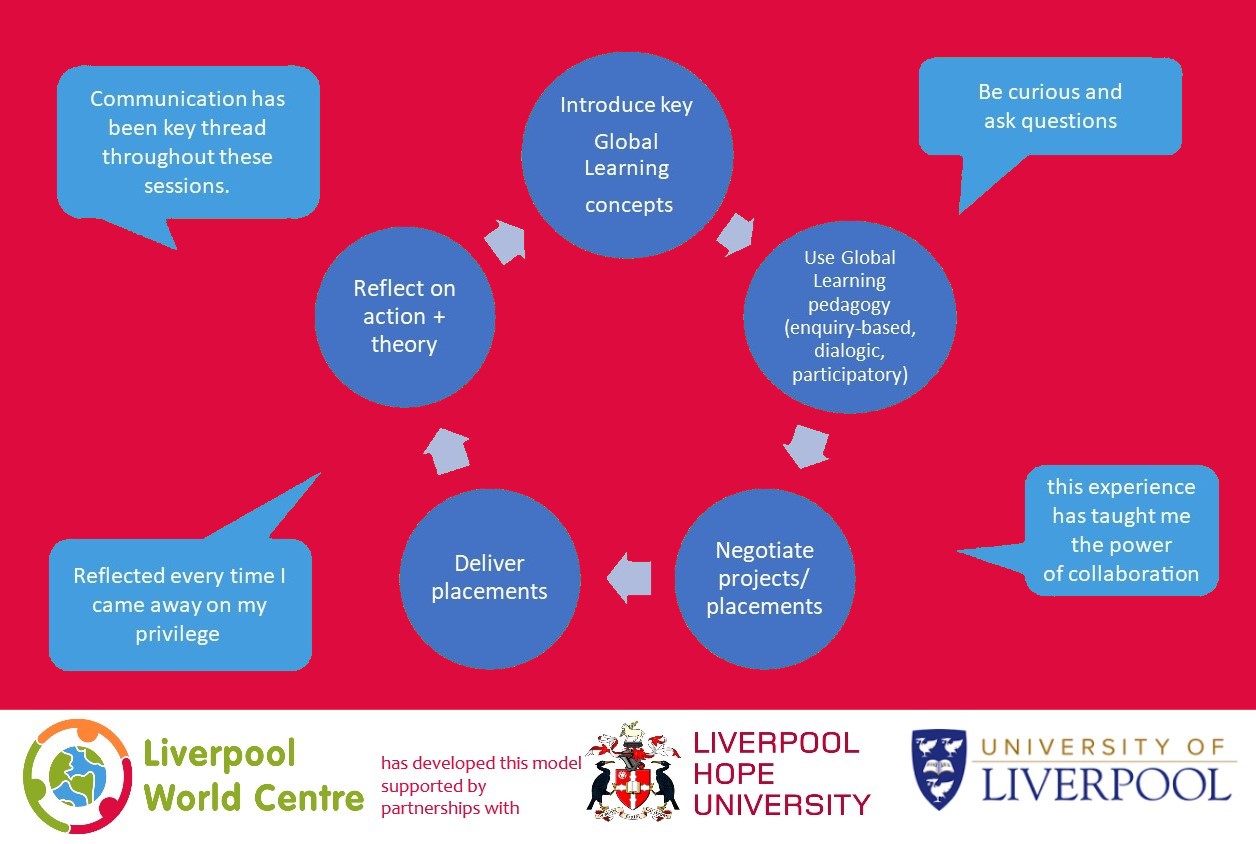
Our engagement model generates impact for students through the use of global learning pedagogy in the context of local community engagement. Drawing on our research and evaluation expertise alongside our strong links across academia, education and community sectors, we are proud of this work and excited about how we might apply it across different subject areas and institutions moving forwards. To date the work has had most impact and testing through our longstanding partnership with Liverpool Hope University, and a newer relationship with the School of Life Sciences at the University of Liverpool.
Liverpool World Centre worked as an evaluation partner on Tracks Through Poplar for its funders, the National Lottery Heritage Fund. The Project was recently shortlisted for the prestigious Heritage Railway Association Awards in the category of ‘Team of the Year’. Read on for more details on the award and the project.
Last year The Terrier Trust established a partnership with The Kent & East Sussex Railway and Global Learning London to create an immersive educational programme for primary school children in the Poplar area of East London. The team who delivered the Project were recently named on the shortlist for the prestigious Heritage Railway Association Awards in the category of ‘Team of the Year’. Whilst pipped for the top prize, being recognised as one of the top 5 teams in the Heritage Railway world was a great feat.
A highlight of the project was the visit of the 150-year-old Terrier steam locomotive ‘Poplar’ to the Poplar depot of the Docklands Light Railway. Over 6 days of school opening hundreds of school children visited the engine, learning about its history and the events it had witnessed over 150 years. It was a chance to tell the story of the Kent & East Sussex Railway as the country’s first light railway and to bring that up to date with information about London’s modern light railway, the DLR.
In addition to the locomotive visit, an educational resource aligned to the school curriculum has been created with the help of local teachers and this is now available through Schools Library Services nationwide. Alongside these digital resources there is a resource box of artefacts which schools can borrow to enhance children’s learning.
An independent evaluation of the project by Liverpool World Centre for its funders, the National Lottery Heritage Fund, said: ‘The project met key objectives and reached at least 2,234 local children and families through programme activities and engagement of schools. Moreover, analysis of children’s responses to programme activities, interviews with teachers and partners and observations of the process, showed evidence of positive impact on teachers’ abilities to include heritage in teaching and learning, and children’s awareness and understanding of heritage and opportunities to participate.’
Ways are now being explored to continue the relationship between The Terrier Trust and The Kent East Sussex Railway with the participating schools in Tower Hamlets.




LWC was invited to share the I-CAN Project with student teachers at Liverpool John Moores University. These trainee teachers are studying a module called Enhancing the Primary Curriculum and are interested in the value and relevance of Climate Education. The 75 students were introduced to the I-CAN website and toolkit and shown how it could be integrated into the classroom. The toolkit can also support them as they engage with experienced colleagues and school leaders to build conversations around the benefits of this type of education on sustainability and the climate emergency.

During the session, we explored our personal values as educators and examined how we could use the toolkit to be positive with young learners about the future considering the issue of Eco-Anxiety. The students experienced some practical activities that they could use in the classroom. They all got really involved in an online activity ranking items and their climate emissions and the discussion that followed was illuminating.
The session introduced this group of trainee teachers to the importance of key critical thinking skills and how these could be developed in students through active and engaging learning strategies, helping learners understand how to use persuasive language in a debate and the need to work together to collaborate on solutions for the future.
This group of future teachers felt that it is important to develop active citizens who are empowered to make a difference in their local communities. The I-CAN Project supports teachers as they help develop agency in young people, and inspires them to act as changemakers and catalysts to build a more sustainable future in education communities. The student teachers will now spend time developing their own ideas for classroom projects to be delivered in February 2023 across 10 Merseyside Primary Schools . This training will help them prepare to work within the UK government’s new education strategy on climate change introduced in April 2022.
You can access the I-CAN toolkit and other resources here: INTERNATIONAL CLIMATE ACTION NETWORK (I-CAN)
We are proud of our longstanding relationships with local universities including Liverpool Hope and LJMU, and even more proud of the fact that this work continues to grow and evolve year on year.

For many years our focus has been on working with teacher trainees and education students, however, this year has seen us develop some new and exciting strands of work in other areas. We are delighted to be working with the University of Liverpool’s School of Life Sciences on their ‘Science and Civic Society Award’, providing a combination of participatory sessions exploring global citizenship themes and community/voluntary sector placements for students. We are only halfway through, but the university is looking to embed the work into degree courses for the coming year, a great result for the LWC team!
We have also delivered sessions for LJMU students within their Visual Storytelling module, a great opportunity for us to share some of our work around digital storytelling and the use of image in participatory education.
We are quietly developing new work with LJMU in teacher education. We also continue to work with Liverpool Hope University supporting staff in teacher education to enhance their global learning strand, supporting 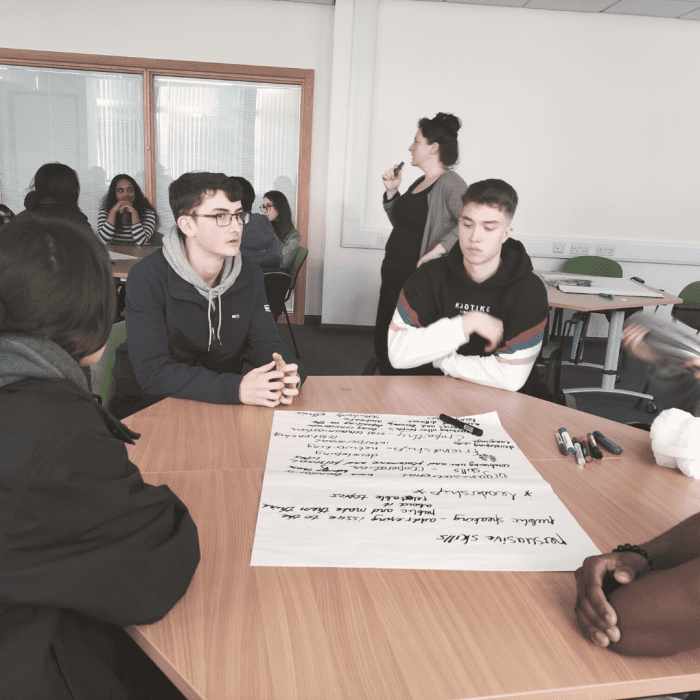 trainee teachers in developing their skills, and opening up the world of global education and global citizenship for BA Education students through a series of guest lectures that sit alongside their community placements. We are working with providers including Asylumlink Merseyside, Farm Urban, Shaping Futures and many more on this year’s placements, offering students a unique and inspiring glimpse into the world of education outside the classroom.
trainee teachers in developing their skills, and opening up the world of global education and global citizenship for BA Education students through a series of guest lectures that sit alongside their community placements. We are working with providers including Asylumlink Merseyside, Farm Urban, Shaping Futures and many more on this year’s placements, offering students a unique and inspiring glimpse into the world of education outside the classroom.
TEESNet continues to thrive under the leadership of LWC Director Andrea Bullivant, and through the network we are constantly developing new work and relationships with universities and academics working in the field of global education. There’s so much more to do, but we are proud of our contributions to the continuation and development of this work in the UK and beyond.
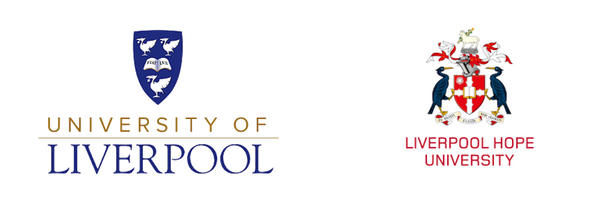
We are pleased to announce that Liverpool World Centre has become accredited by Children’s University. At this time, any Children’s University school that participates in The Great Swap Shop project will be able to earn credits.
What is Children’s University?
Children’s University is a charity that aims to develop a love of learning in young people by encouraging participation in extra-curricular activities. You can learn more about Children’s University here.
What is The Great Swap Shop?
The Great Swap Shop is a collaboration between Liverpool World Centre and Faiths4Change, sponsored by MRWA, to create behaviour change in how we consume fast fashion and create textile waste. Learn more about the project and how you can participate here.

From the moment this project landed on my desk at the end of 2021, I knew it was going to be special… Invited by our friends Global Link in Lancaster to be one of their five partners across the North West, the project brings together history, global learning, community and more. I’m a bit of a history geek on the quiet, and our first team training day at the People’s Museum only served to fire my enthusiasm further. Going down into the archives – the bowels of the museum – we were each presented with a folder of original documents pertaining to the stories of children who migrated to the North West during the Spanish Civil War. Wow. I hadn’t anticipated the emotional response I had to handling old letters and reports. It is truly like being transported back in time.
The project has been an opportunity for Liverpool World Centre to work with volunteers once more, something that hasn’t featured heavily in what we do with communities for some years. We had a great response to our call-outs and ended up working with a team of ten volunteers. I felt incredibly honoured to take them into the Liverpool Records Office and share with them the awe that I felt myself on first handling primary source documents, some from hundreds of years ago.
Those volunteers have gone on to research and write the stories of nine individuals who migrated into or out of the North West between the end of the 8th century and the middle of the 20th! The breadth of our research has at times been challenging, but so rewarding, with the team becoming really invested in the lives and stories of those about whom they chose to write. What has been created so far across the partner organisations, and covering our whole region, is incredible. Well worth a look for historians, educators and the public alike, it has been meticulously put together by the team at Global Link. We’re so proud to have been a part of it.
In terms of our wider work on ‘global education’, maybe at first the links don’t seem obvious, but they are there, they really are. What the rich tapestry of individual stories highlighted most strongly was the vast social history linked to each story, bringing to life the impact of industrialisation, trade, empire and more on the lives of ordinary people. We cannot adequately reflect on where the world is today, and the challenges we face, without having an understanding of where we have come from, of how the past has shaped the present, and how fundamentally important migration has been as an engine for progress. It enriches and shapes our lives.
We are all migrants.
Watch this space, there’s more to come in Years Two and Three of the project, including working with school children to collect more recent oral histories, and touring our work with exhibitions and more. The stories collected so far, and our interactive map can be found at www.migrationstoriesnw.uk/stories
“People don’t realise that when they hurt the environment, they are also hurting themselves”
– Ella-Rose, Dakota and Emelia from Kings Meadow Primary School
This autumn brought the 27th Conference of the Parties (COP27) in Egypt, where the future of the planet was discussed between world leaders, a keystone event in driving collaboration against climate change. Whilst COP27 is primarily a discussion between members of the older generation, we wanted to provide a platform to the generation that will be most strongly impacted by climate change throughout their lives. The conversations we have now will define the future of those currently in primary school, so it is only right that their voices should be heard.
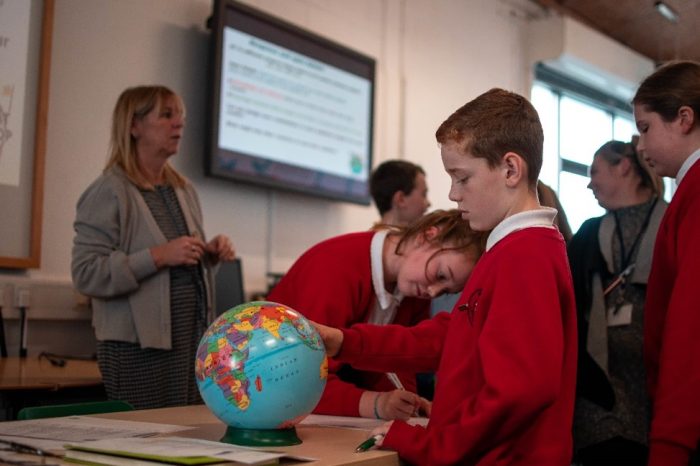
The workshop was sponsored by Merseyside Recycling and Waste Authority as part of an ongoing project to reduce textile waste and waste in schools and brought together Liverpool World Centre and Faiths4Change with six schools from Sefton, and students from the University of Liverpool, in a Model COP27 at Southport Eco Centre. Pupils from each school represented different countries from around the world. They collaborated with each other to understand different ideas countries may have and what they could be doing to push each other to go further. The pupils identified that many emerging countries can only react and adapt to climate change whereas developed countries have the power to change conditions – a conversation that was also happening at COP27 in Sharm-el-Sheikh.
The climate conference participants researched important issues for their designated countries, for example, the sea level rise in the Marshall Islands or pollution levels in cities of more developed countries such as China. They branched off into four groups to discuss four topics most relevant to their climate and issues: energy, cities, forests (and food) and oceans. We have put some of the key points and recurring themes raised during these breakout sessions into a word cloud:
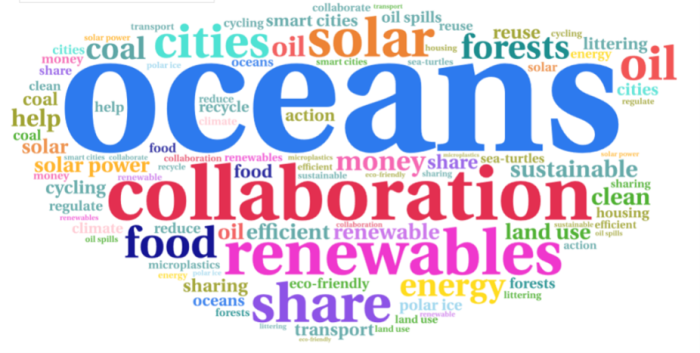
At the end of the day, much like in a UN conference, the pupils came to a shared resolution. Except here it was in the form of pledges. The pupils pledged that they would…
- Increase awareness and education around climate change.
- share [their] skills and knowledge about [differing impact of] climate change between countries
- Develop technology to fight climate change
- Persuade governments to cooperate and continue working together
- Raise the amount of money for climate change solutions.
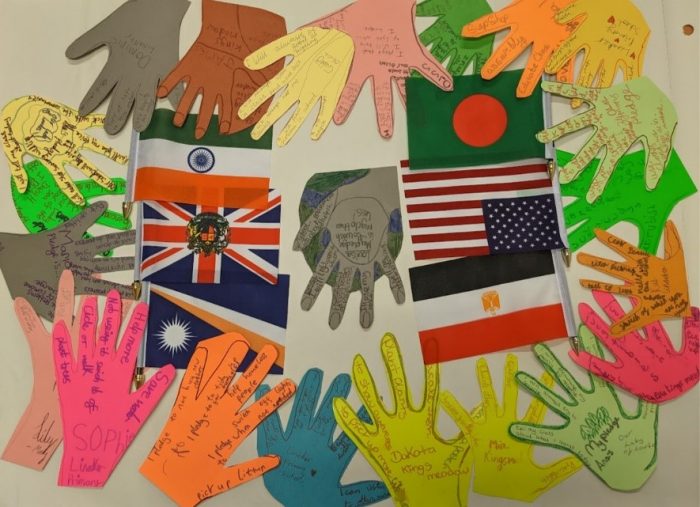
Pledges written by pupils on the day
The pupils will be taking these pledges forward within their Eco Councils and sustainability projects in their schools.
Young people from Our Lady of Lourdes Primary School spoke to us about the impact their Eco Council has had within their school. They said,
“We are spreading awareness because it is our generation that is affected by climate change the most, and we are the ones who will have to live with it. Children learning from other children is the best way to spread awareness in our community.”
Amplifying young people’s voices is one of the most impactful things we can do in the battle against climate change. Our future world leaders are learning how to speak up, ask important questions and demand answers. Change starts with a conversation; and not only did this project initiate a conversation between but also sow the seeds for conversations within their families, classrooms, and the wider community.
Pupils also had the opportunity to listen to guest speakers who are established in their fields, inspiring students to use their voices as an important tool for climate justice and inspiring them to work alongside the ideas of the 17 Sustainable Development Goals which highlight the key global targets to create a more sustainable, intersectional, and united world.
One of the guest speakers encouraged Eco Councillors representing their schools to utilise outdoor space, ask teachers to teach more about nature and get as many people involved as possible. This idea was further developed through the pupils’ plans for ‘Swap Shops’ as part of the Great Swap Shop Project, a project promoting second-hand clothes and sustainable fashion as a way of reducing textile waste and the impacts of this on the environment.
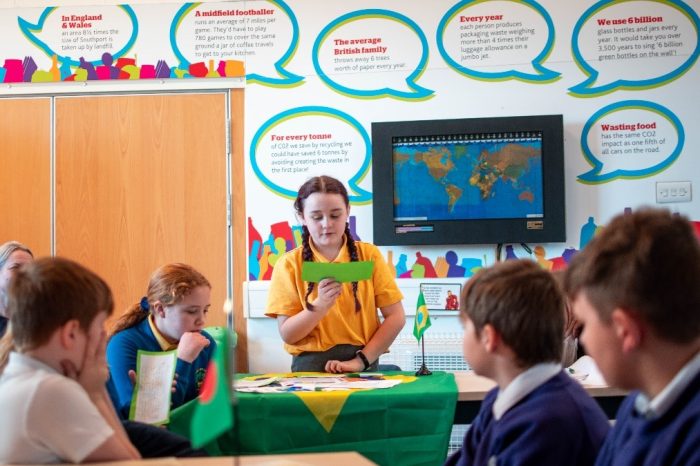
What we take away from the day is that we all have a voice and ideas to contribute in the efforts to decrease climate change and that we can use this voice to put pressure on those in power and encourage more collaboration. Baby 8 billion has just been born, in this context, we must remember the words of UN Secretary General Antonio Guterres at COP27 in Egypt
“How will we answer when ‘Baby 8 Billion’ is old enough to ask: what did you do for our world and for our planet when you had the chance?”
The following schools participated in this Model COP27: Linaker Primary School, Kingsmeadow Primary School, Waterloo Primary, Our Lady of the Sea Primary School, Our Lady of Lourdes Catholic Nursery & Primary School and St Vincent De Paul Primary School.
This blog was written by Juliet Pone and Lily Eaton who are working with the Liverpool World Centre as part of the Science and Civic Society Award. Juliet is a 2nd year BSc Marine Biology student and Lily is a 2nd year BSc Biological Sciences student at the University of Liverpool.
Karen Wynne was Liverpool World Centre’s lead for our Community work before recently taking on additional responsibilities as Co-Director. The change coincides with wider reorganising and repositioning at LWC and an expansion of our collaborative working model. Besides her responsibilities at LWC, Karen is also an artist, musician and activist and is involved with a number of community and arts organisations in Liverpool. It was high time we sat down with Karen to chat about how her role at LWC has evolved over the years. Read on for excerpts from our interview with Karen.
Q: When did you start working at LWC and how has your role evolved?
Karen: I started with LWC in 2016 as our Events Co-ordinator. At that point, for me it was a great part-time job with an interesting organisation that allowed me to continue my work as a community/arts producer and musician alongside. Initially, I was coordinating the team, leading communications, supporting finances and managing events, but it didn’t take long for me to get drawn into the world of global education. I’d already done loads of non-formal education work (in ESOL, music, community arts and more), and so it was a natural progression for me to start to lead on some of our non-formal work with adults and communities. LWC has been great like that, with my role adapting and shifting to accommodate my skills and helping me build new skills as I have wanted or needed to.
Q: What’s a typical day at LWC like for you?
Karen: Bonkers! I always wanted a job that never got boring, and working in the charity sector at grassroots level certainly delivers on that. Leading projects always means that you have to be on top of a range of coordination, supporting people and partners, managing budgets, marketing stuff, reporting and more. My new role as Co-Director just amplifies that, really. It’s great! I might be delivering participatory sessions for BA Education students at Liverpool Hope University one day, and planning funding applications and cashflow projections the next… Never a dull moment.
Q: Tell us about your current top favourite project
Karen: One of the projects that has really had a great impact on me has been DEPAL. Leading an Erasmus+ project brings its challenges, particularly managing international collaborations during a pandemic! At the same time, the project brought together participatory methods, creativity and storytelling, and digital work in such a special way. I learnt a load of new skills from our amazing partners in Ireland, Italy, Spain, Greece and the UK, and consolidated some existing skills. The chance to travel and exchange best practice with like-minded educators who come from a slightly different perspective and context is so enriching. I’m truly devastated that continuing these international partnerships has become so tricky, and that the UK ‘replacements’ for things like Erasmus just do not allow for the kind of non-formal community and knowledge exchange that we have done so much of over the past five years or so. On a plus note, though, I’ve got friends across the continent now so will never be short of holiday ideas…
Q: Can you tell us about one important connection you made during your time at LWC?
Karen: My work with LWC is constantly reminding me of how extraordinarily interconnected our world is, from people and places to our environment, both local and global. Taking notice and becoming empowered to take action (and hopefully empowering others) is such a powerful tool for feeling a sense of worth, a sense of community, a sense of belonging and a sense of power in the face of injustice. Community comes in so many forms, and I feel privileged to be part of many communities that LWC has brought me into contact with.
Andrea Bullivant, along with Karen Wynne, has taken on additional responsibilities as the new Co-Director of Liverpool World Centre. This change was part of larger restructuring and rethinking taking place at LWC as it prepares for new challenges. Along with Co-Directorship of LWC, Andrea is also Director of TEESNet and, through LWC’s collaborative leadership model, will continue to work on project delivery in the Higher Education sector. Several months ago, we sat down with Andrea to discuss her Higher Education work and how it has evolved through her time at this organisation. We are republishing the interview (with minor updates) in the light of these changes.
Andrea has been part of LWC since 2010. Recounting her first role, Andrea tells us that it was focused on working directly with Liverpool Hope University on a project that was funded by the (then) Department for International Development. The project’s goal was to embed global citizenship across all of Liverpool Hope’s Education courses. It is fascinating to hear that not only was the project rolled out to other local universities, but the work continues today through the teacher education course Andrea leads called Wider Perspectives in Education. What’s more, this project sowed the seeds for LWC becoming the lead facilitator on TEESNet. Below you can read Andrea’s answers to some more of our questions.
Q: What is it like working with LWC day-to-day?
Andrea: A typical day depends on what time of the year it is. I lead a course in teacher education at Liverpool Hope University, so if that is back on the timetable, I might be hopping on a bus to deliver teaching and meet with colleagues there. Occasionally, I will travel to other parts of the UK to visit projects I’m evaluating. In the recent past, I might have even been travelling elsewhere in Europe for one of our EU projects, but sadly this has become rarer.
However, the majority of my time is spent at LWC where a typical day can range between following up on emails, meetings to discuss project ideas, preparing material for delivery and writing up reports. Whilst local meetings are now face to face, I still have a lot of zoom meetings, which might include facilitating a Steering Group meeting for TEESNet or discussing a research project with a colleague in Italy. In between these meetings, I will be catching up with notes and actions from previous meetings, for example, developing a tool to measure changes in young people’s ‘nature-connectedness’. I’ll also be sharing dilemmas and problem-solving with colleagues, as we continually reflect on our work and explore creative ways to draw in funding!
Q: What’s your current top-favourite project and why?
Andrea: My top favourite piece of work right now is an evaluation I’m carrying out of a project designed to promote young people’s well-being and agency through closer connection with the outdoors and nature. It’s really interesting to explore research on the impact of more engagement with nature and outdoor spaces and develop tools to ‘measure’ changes in outlooks and skills specifically for young people involved in the project.
Q: One connection you’ve recently made through LWC that you want to talk about.
Andrea: Choosing any one connection is hard! The nature of LWCs work means that all the time we are encountering people with a passion to make a difference in the world and with creative ideas. But to offer one recent example, I’ve mentioned that I’m involved in teacher education at Liverpool Hope University and one of my students also turned out to also be a local Councillor. We connected through mutual interest in the United Nations Sustainable Development Goals (SDGs) – I use them in the teacher education course and she brought them to the attention of council colleagues. Recently the same (now ex) student came to talk to a new cohort of students and inspired them by sharing how the SDGs were relevant locally.
Andrea Bullivant and Karen Wynne have stepped into the role of Co-Directors of Liverpool World Centre in a move towards extending its collaborative working model. This change comes as part of wider reorganisation for LWC as it repositions itself to build on its 22-year history and continue to make positive social change in 2023 and beyond.
The collaborative approach is a strong thread throughout LWC’s work, as can be seen in examples of our work with schools, universities and communities, and particularly so in our role leading collaborative networks like TEESNet. Speaking on the subject, Andrea said, “It meant we could model the kind of collaboration we aspire to internally, demonstrate an alternative model of leadership and promote a flatter structure of relationships across the team. Pragmatically, it also meant that Karen and I could retain some of our delivery work alongside co-director tasks”.
When asked about their priorities through this transition, the Co-Directors said, “At present, our priority is to ensure that LWC continues to deliver the high-quality work with valued partners, locally, nationally and internationally through our current Erasmus+ projects. We have a fantastic small team, and we want to ensure everyone is supported to deliver this work in the transition to the new leadership model”. During this period of transition, the LWC team has prioritised close communication and keeping the roles under review, with support from our Trustees. Going forward, LWC will be closely reviewing our current work streams, both in terms of the different sectors we work with and areas of practice, policy and research, and looking at ways of securing funding which can meaningfully support our aspirations to act as catalysts for social change.
It may be of interest, especially to our partners, that each Co-Director is leading on key tasks. For example, Karen manages LWC contracts and finance, and Andrea has oversight of projects, their delivery and how this is monitored and reported on. On this topic, Andrea noted, “We makes these distinctions clear to partners so that they know who to contact as far as possible”. The Co-Directors added, “While it will take time for roles and lines of communication to settle, we want to emphasise the Co-Director model to people and organisations we work with, and encourage them to feel they can approach either one of us”.
